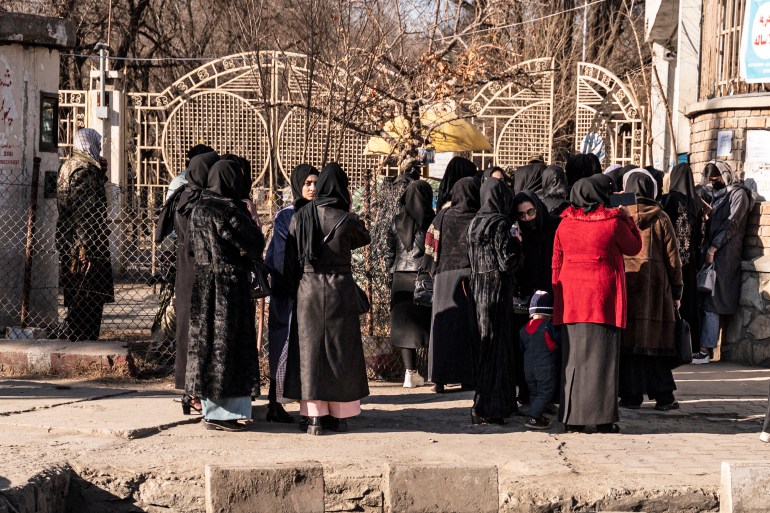UN to Taliban: ‘Vital’ to reverse ban on women in NGOs
The Taliban’s decision to ban women from working at NGOs has seen many organisations suspend aid work in Afghanistan.

The United Nations mission to Afghanistan has asked the country’s Taliban administration to reverse its ban on women from working in non-profit organisations, with major global non-governmental organisations (NGOs) withdrawing from the country in response to the restrictions.
“Millions of Afghans need humanitarian assistance and removing barriers is vital,” the UN Assistance Mission in Afghanistan (UNAMA) said in a statement on Monday. The statement added that UNAMA’s acting head and humanitarian coordinator Ramiz Alakbarov had met the economy minister, Mohammad Hanif.
Keep reading
list of 4 itemsPhotos: Tourist numbers up in post-war Afghanistan
Taliban ban on girls’ education defies both worldly and religious logic
Afghanistan calls for ‘respect’ after Cricket Australia snub
Hanif’s ministry on Saturday ordered all local and foreign NGOs not to let female staff work until further notice. The orders do not apply directly to the UN, but many of its programmes are carried out by NGOs subject to the order.
On Sunday, three global NGOs – Save the Children, Norwegian Refugee Council and CARE International – said in a joint statement that they were suspending their programmes as they awaited clarity on the administration’s order.
“We cannot effectively reach children, women and men in desperate need in Afghanistan without our female staff,” the statement said, adding that, without women driving the effort, they would not have reached millions of Afghans in need since August last year.
Separately, the International Rescue Committee (IRC) said in a statement that it was suspending its services in the country, citing similar reasons. IRC said it employs more than 8,000 people in Afghanistan, nearly 3,000 of whom are women.
The suspension of some aid programmes that millions of Afghans access comes at a time when more than half the population relies on humanitarian aid, according to aid agencies, and during the mountainous nation’s coldest season.
Earlier, international aid agency AfghanAid said it was immediately suspending operations while it consulted with other organisations, and that other NGOs were taking similar actions.
The International Committee of the Red Cross in Afghanistan also on Sunday expressed concern at the move and an earlier bar on women from attending university, warning of “catastrophic humanitarian consequences in the short to long term”.
But the Taliban administration has so far shown no signs of reconsidering the bans on women working at NGOs or studying in universities.
On Saturday, the Ministry of Economy, which issues licences to non-profits, said it had received “serious complaints” that women working in NGOs were not observing “the Islamic hijab and other rules and regulations pertaining to the work of females in national and international organisations”.
Dozens of organisations work across remote areas of Afghanistan and many of their employees are women, with several warning a ban on female staff would stymie their work.
The latest restriction comes less than a week after the Taliban authorities banned women from attending universities, prompting global outrage and protests in some Afghan cities.

Since returning to power in August last year, the Taliban has also barred teenage girls from secondary school.
Women have also been pushed out of many government jobs, prevented from travelling without a male relative and ordered to cover up outside of the home, ideally with a burqa.
They are also not allowed to enter parks or gardens.